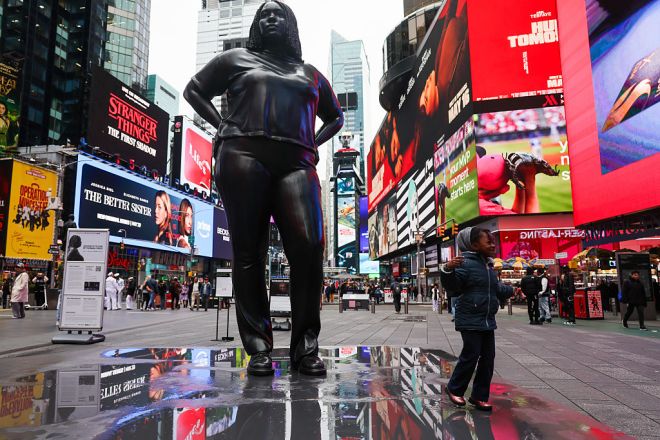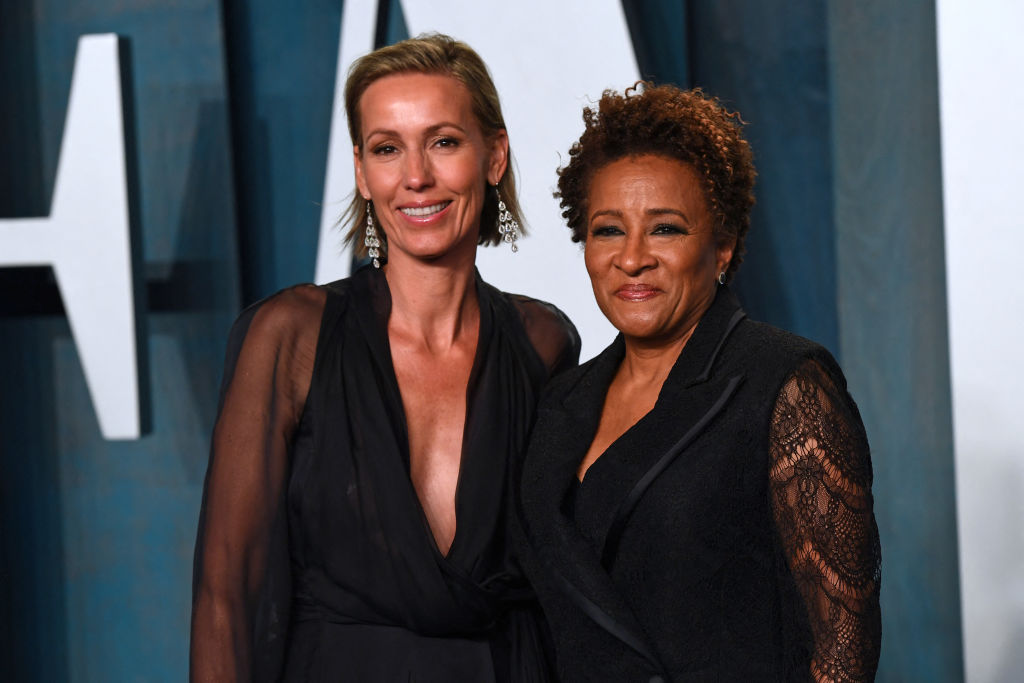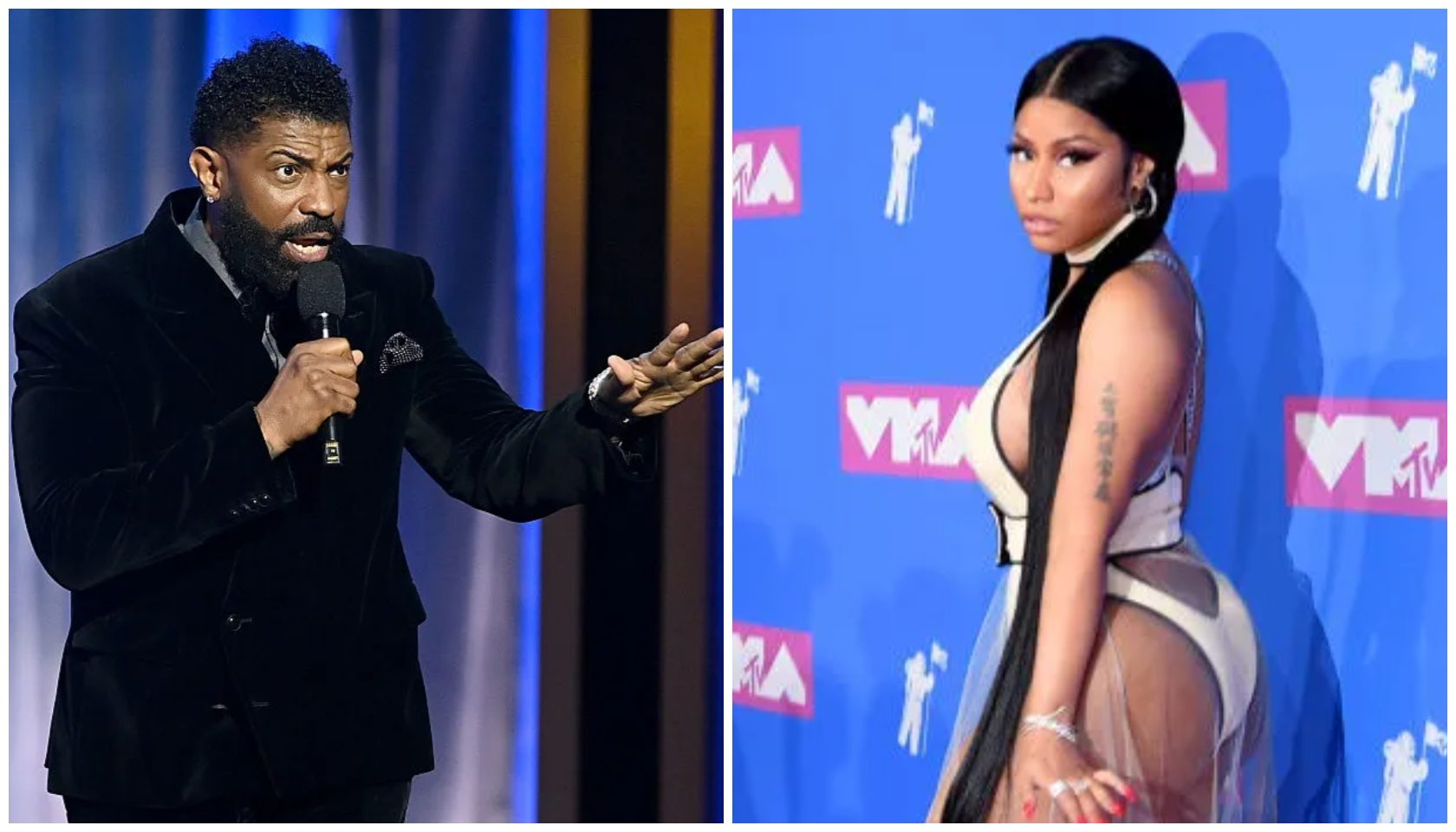They Hate The Times Square Statue Because It Looks Like Us
The Times Square Statue Dares To Be An Ordinary Black Woman—And That’s Exactly Why It’s Under Attack [Op-Ed] - Page 2
Share the post
Share this link via
Or copy link

In the heart of Times Square stands Grounded in the Stars, a 12-foot-tall bronze statue of an unassuming young Black woman, the work of British artist Thomas J. Price. Posed hands-on-hips and looking confidently ahead, she wears simple street clothes—a T-shirt and jeans. Grounded in the Stars is part of Times Square Arts Projects and is described as “A fictionalized character constructed from images, observations, and open calls spanning between Los Angeles and London. The young woman depicted in Grounded in the Stars carries familiar qualities, from her stance and countenance to her everyday clothing. In her depiction, one recognizes a shared humanity, yet the contrapposto pose of her body and the ease of her stance is a subtle nod to Michelangelo’s David. Through scale, materiality, and posture, Grounded in the Stars disrupts traditional ideas around what defines a triumphant figure and challenges who should be rendered immortal through monumentalization.”
The Backlash Was Loud…and Telling
Instead of quiet reflection, the statue provoked a firestorm of backlash.
Soon after its unveiling, criticism spread across TikTok and Instagram. Users mocked the figure’s posture, size, and perceived plainness. Some called her angry-looking, unfeminine, or even grotesque. Fox News’ Jesse Watters dismissed the statue outright, calling it a “DEI statue” and questioning why a woman who “did nothing” should be honored in public. We have grown to almost expect this commentary from people who don’t look like us but Watters comments were joined by our voices. “She doesn’t represent us,” they alluded. “She’s not the kind of Black woman we want on display.”
In a now-deleted TikTok video, Jeanine Uqdah shares her outrage, saying, “They really think we’re a joke. Like that big behind 12-foot overweight Black woman in the middle of Times Square, that is what they chose to represent us. That’s what they think about us, y’all. Big, overweight, just—there’s nothing attractive about the statue. There’s nothing appeasing. It’s like this monster, this monster of a Black woman who’s dominating. Like y’all know what it gives—this aggressive, overpowering, masculine Black woman. That’s what the statue gives. It does not give anything feminine, soft, strong. Powerful, fit, no. It’s a big, Black, fat, overweight woman in the middle of Times Square to take pictures of. Y’all—they really be playing with us, and until we recognize what is happening out here, they gonna keep playing with us. They’re gonna keep playing with us because we play with ourselves. Baby, this—this is wild, wild, wild.”
That begs the question—what kind of representation is acceptable?
RELATED CONTENT: 7 Famous Black Women Who’ve Shared Their Body Image Issues
Who Gets to Be Worthy?
Love MadameNoire? Get more! Join the MadameNoire Newsletter
We care about your data. See our privacy policy.
When critics fixate on her nose, her size, her clothing, or her expression, they reveal a deep discomfort with the ordinary, particularly when ordinary comes in the form of a plus-size, full-featured Black woman.
This TikTok criticizes the statue as “embarrassing,” while an IG reel frames the backlash as evidence that Black women don’t want to confront their own natural appearance. Also on Instagram, @therealtoonz posted a cartoon that captured both sides of the debate, highlighting those who mocked the statue’s features and those who defended the representation of an everyday Black woman.
The Aesthetic Version of Real

The heat aimed at Grounded in the Stars says far more about us than it does about the statue. In an era dominated by filter culture, surgical enhancements, and performative “body positivity,” we’re still deeply bound to Eurocentric beauty standards. Slim, sculpted, smooth—these are the features we’re conditioned to celebrate. If you’re not thin or symmetrical, you’d better at least be exceptional.
The statue, however, asks us to recognize beauty in the everyday. She isn’t a celebrity. She’s not a symbol of success or struggle. She just is. And that’s what unsettles people.
When Authenticity Is Too Real
This discomfort isn’t new. In today’s curated world, it’s been amplified. We live in a time where “natural beauty” is often code for minimalistic glam, not truly untouched. Even the movements that claim to embrace authenticity are often repackaged, retouched, and filtered for palatability. There’s a clear preference for the aesthetic version of real: soft edges, symmetrical features, curated imperfections.
Stylist GooGoo Atkins addressed this head-on in a recent Instagram post. She shared two photos from a 2015 shoot—one taken on a phone, the other professionally edited:
“Regardless of whether you think the picture on the left (or right) is amazing, it’s the real me (with a lil makeup 😉)…What I’m not about to do is take a picture as GooGoo and edit it to look like Esmeralda Fantastica!”
Atkins wasn’t just critiquing the culture of over-editing, but also naming the root of the issue: there is societal discomfort with showing up as our authentic selves.
“YOU LOOK HOW YOU LOOK. Your audience has two options: they can take it or they can leave it,” she notes. In a world increasingly obsessed with digital perfection, this kind of radical self-acceptance feels revolutionary.
She ended with: “…they’re chasing something that DOES NOT exist. PERFECTION is a myth.”
RELATED CONTENT: Watch ‘Listen To Black Women’ Episode 2: Curves, Criticism And Everything In-Between
The Audacity of Unapologetic Presence
This is the core of why Grounded in the Stars became a lightning rod. The woman cast in bronze is not chasing anything. She’s not edited. She’s not tailored to trends. She simply stands confident, composed, and unapologetically herself. For many, that kind of visibility feels confrontational.
Singer Lizzo, a frequent target of similar critiques, recognized the parallel. In a now-viral video, she posed beside the statue, playing a clip from comedian Katt Williams: “You can be fat. You can be Black. But you can’t be no fat, Black, bitch.” The line—raw, biting, and heartbreakingly real—highlighted a truth many Black women know too well. Society tolerates our visibility only when it fits a narrow mold.
We’ve Been Here Before
There’s power in the ordinary. In honoring a woman who doesn’t perform, doesn’t aspire to be “iconic,” doesn’t cater to commercialized aesthetics, we affirm that everyday Black women deserve to be seen. Not just when we’re glammed up, not only when we’re trailblazing, not because we’ve overcome.
Just because we exist.This isn’t a new concept. The “Black is Beautiful” movement of the 1960s dared to say the same thing. Back then, the Grandassa Models didn’t need Hollywood polish to walk runways in Harlem. They were aunties, students, and secretaries. They were women who wore their natural hair and full figures with pride. The point wasn’t glamour. It was presence.
The Times Square statue continues that legacy. Yet the fact that it sparked such controversy shows how far we still are from embracing it.
We’re Still Editing Ourselves
We like to believe we’ve evolved. That “body positivity” includes everyone. However, when a Black woman with full features and a soft midsection can’t be cast in bronze without national mockery, then we’re not as evolved as we think.
We don’t have to agree on whether the statue is beautiful in a conventional sense. We should ask ourselves why the lack of convention makes us so uncomfortable. Why do we still cling to the idea that Black representation requires perfection?
What Thomas J. Price created was a mirror. It reflects the faces we pass on the street and the ones we often overlook. It reflects the parts of ourselves we’ve been taught to edit, hide, or reshape. For some, that’s hard to sit with. However, that’s also where the work begins. If we want a world that truly values Black women—beyond performance, beyond pain, beyond polish—we have to include everyone. That includes the loud and the quiet, the bold and the bashful, the glamorous and the ordinary.
When we tear down this statue, we’re reinforcing the lie that some of us are more worthy of visibility than others. Until we unlearn that, we’ll keep building pedestals for ideals and ignoring the real women already standing tall.
RELATED CONTENT: ‘I Would Like To See Fat, Black Women Living The Fullness Of Their Lives’ Sonya Renee Taylor Talks Fat Bodies In The Media
Related Tags
Black beauty standards Black female representation Black femininity Black women in art body positivity cultural backlash fatphobia Goo Goo Atkins Grounded in the Stars Jeanine Uqdah Lizzo public art controversy statue criticism Thomas J. Price Times Square statue unfiltered beauty-

Meet Dominique Fils-Aimé, The Haitian-Canadian Star Redefining Jazz For A New Generation: ‘This is My Vision' [Exclusive]
-

Cooking With Purpose — How Brittney Williams Honors Her Caribbean Roots Through Food
-

9 Famous Lesbian Women Who Were Married To Men
-

Purpose Behind The Lens: How Nate Edwards Films The Extraordinary Inside The Everyday








